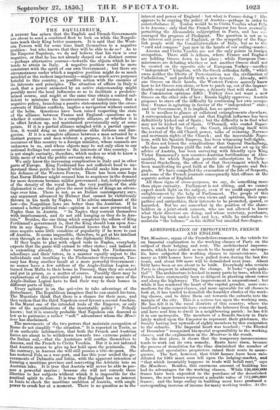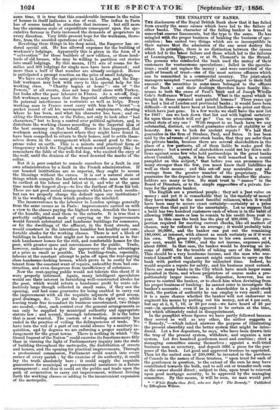ADMINISTRATION OF IMPROVEMENTS, FRENCH AND ENGLISH.
Tli:E Mowiteer, organ of the French Government, is the vehicle for an Imperial explanation to the working classes of Paris on the subject of their lodging and rent. The architectural improve- ments, which have added so much to the beauty of the metropo- lis, have subjected the working .classes to inconvenience. As many as 1560 houseshave been pulled down during the last five years, and about 100 more will be demolished next year. About 6552 have been or are about to be built. Everybody who revisits Paris is eloquent in admiring the change. It looks "quite pala- tial" ! The architecture is backed in many parts by trees, which the French have customarily been so diligent in planting about towns and along the highways. The improvement is unquestioned ; but while it has rendered the heart of the capital grander, more com- modious for the upper classes, and more agreeable for all classes to look at, it has tended to demolish the humbler abodes of the work- ing classes, and to drive them out towards the suburbs into the margin of the city. This is a serious tax upon the working man. He has felt it in the rural districts of this country, where the landlord's improvements have removed the labourer from the land, and have sent him to dwell in a neighbouring parish : lie has felt it in our metropolis. The members of a Benefit Society in Paris lately waited. upon the Emperor to represent their grievanoe, the Society having lost upwards of eighty members by this emigration to the suburbs. The Imperial heart was touched; 'the Elected of December " recognized his special responsibility to the working classes, and the explanation in the ..lioniteur is the result. In the first place, it shows that the temporary inconvenience tends to work out its own remedy. Rents have risen, because the process of demolition for the time diminished the number of abodes, and speculative proprietors raised their rents in conse- quence. The fact, however, that 6550 houses have been sub- stituted for 1565 must soon tell upon the lodging-market, and " that which invariably happens in trade will befall rent," says the Moniteur. Besides, this enormous amount of building has had its advantages for the working classes. While 126,000,000 francs have been expended in the purchase of the demolished houses, the new houses represent a saleable value of 712,000,000 francs ; and the large outlay in building must have prodneed a
corresponding increase of income for many working es. At the same time, it is true that this considerable increase in the value of houses in itself indicates a rise of rent. The influx to Paris has of course tended to stimulate that increase ; but still more has the enormous scale of expenditure consequent upon the spe- culative fervour in Paris increased the demands of proprietors in every direction. Very little present hope for the workmen, there- fore, from the unaided operations of trade.
Revolving these things in his deep mind, the Emperor has or- dered special aid. He has allowed expenses for the building of workmen's lodgings. Apparently this is given in the form of a " subvention" for those builders of new edifices, or those land- lords of old houses, who may be willing to partition out stories into small lodgings. By this means, 1171 sets of rooms for fa- milies and 3641 odgings for single men have been planned; and more than a half of that number are already occupied. Hence is anticipated a prompt reaction on the price of small lodgings.
We have exactly the same grievance in London, and the Bali' workmanmay look with envy to this special help for the
Working class. Charity begins at home" : one of " the Powers," at all events, does not busy itself alone with Turkey, but looks after the poor labourer in France. As a set-off; Eng- lish workmen may learn that the Imperial authority carries out its paternal interference in restraints as well as helps. Every working man in France must carry with him his " livret "—a pocket record of all his movements and employments, showing where he has been, and what his character has been ; and en- abling the Government, or the Police, not only to look after "bad characters," but to keep a control over political agitators, ami, to distribute the working classes according to the Imperial idea of the best economy in that behalf. Hence it has happened, that workmen seeking employment where they might have found it, have been compelled to return to their homes; and to settle them- selves down in the arrangement which seemed good to the su- preme ruler on earth. This is a minute and practical form of vicegerency which the English workman would scarcely like he remembers the fable of the well-fed dog, who excited the envy of the wolf; until the denizen of the wood descried the marks of the collar.
But it is poor comfort to console ourselves for a fault in our own administration by a fault in the French administration. If our boasted institutions are so superior, they ought to secure the blessings without the curses. It is not a natural state of things which compels the hardest workman—the man who must be earliest at his labour and latest at it, and who at the spine time needs the longest sleep—to live the farthest off from hig Those are not good social arrangements which have such results : but can we properly charge the default upon. our institutions ? It is the working of them which produces the mischief.
The inconvenience to the labourer in London springs generally from the same causes as in Paris : improvements carried on with a view to the elasseli paying the highest rents, demolish the homes of the humble; and send them to the suburbs. It is true that a perfectly enlightened mode of carrying on the improvements wild furnish substantial and handsome buildings for commerce, or for the dwellinge -of the affluent, in the front streets, and would construct in the interstices humbler but healthy and com- fortable abodes for the working classes. There is not a block of buildings in London that might not be so constructed as to fur- nish handsomer homes for the rich, and comfortable homes for the poor, with greater space and convenience for the public. Trade, however, endeavours to give the appearance of these advantages at a price as small as possible. The building-trade, especially, labours'at the Constant attempt to palm off upon the rent-paying class handsome-looking houses, which prove to be costly for the tenant from the constant want of repairs, unhealthy from bad con- struction, and even dangerous from insufficiency of substance. Now the rent-payingpublic would not tolerate this cheat if it were properly informed. Again, many intelligent speculators would see their interest in furnishing well-constructed abodes for the poor, which would return a handsome profit by rents col- lectively large though collected in small sums, if they saw the opening, and had some guarantee for being enabled to carry out the improvement with all the requisite adjuncts of good access, good drainage, &cr. To put the public in the right way, while leaving trade free to conduct its business unrestrained, two things are needed,—first, such control over the general arrangements as can only be supplied by municipal authority and appropriate statute law ' • and second, thorough information. It is the latter that is most wanted. The custom of a trading community has ended in the practice of veiling the delinquencies of trade. We have torn the veil of a part of our social abuses by a sanitary in- quisition, aad by degrees we are enforcing a proper sanitary ar- rangement for the great towns. There is nothing in which the Grand Inquest of the Nation " could exercise its functions more fitly than in turning the light of Parliamentary inquiry into the state of building throughout the metropolis, the distribution of streets and houses, and the opening for practical improvements. Through a professional commission, Parliament could search into every corner of every parish ; by the exercise of its authority, it could lay the truth absolutely bare ; it could supply the requisite guarantees for municipal or governmental assistance in a 'future arrangement ; and thus it could set the public and trade upon the path of cooperation to carry out improvement, without driving forth the working classes or adding to the inconvenient expansion of the metropolis.



























 Previous page
Previous page